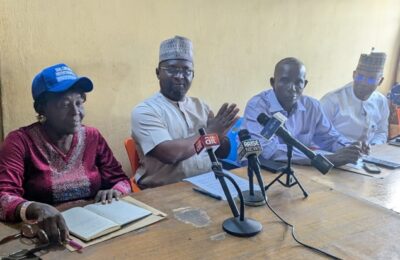In a nation already fatigued by the endless masquerade of political opportunism, the African Democratic Congress, ironically named as though it were the custodian of continental dreams, has become the most distinguished custodian of inconsistency. It exists not as a political party in the true sense of ideology, conviction, or historic purpose, but as a tragicomic refuge for restless politicians perpetually adrift in the turbulent marketplace of Nigerian democracy. If other parties at least attempt the theatre of doctrine, however hollow, the ADC has elevated purposelessness into its permanent vocation, baptising defection as destiny and enthroning inconsistency as its crown jewel.
The very name suggests weight and grandeur, evoking a vision of an African renaissance and democratic revival. Yet what stands in its place is a carnival of contradictions. Where parties aspire to direction, the ADC cultivates drift. Where parties strive for cohesion, the ADC celebrates dispersal. It is less a party than a political Uber, ferrying jobless politicians from one ephemeral address to another, each passenger entering with fanfare and departing with haste. As Malcolm X once warned, “If you don’t stand for something, you will fall for anything.” In the ADC, falling is no accident; it is an art form, a chosen choreography of collapse rehearsed with unrelenting devotion.
To describe the ADC is to engage in a gallery of metaphors, for plain language seems too impoverished to capture its tragic absurdity. It is a ship adrift upon waters without compass or rudder, a caravan that trudges without destination, a chameleon that not only alters its colours but forgets it ever bore one. It is a mirage in the desert, shimmering to the thirsty eye yet dissolving at the moment of approach. If politics were a circus, the ADC would be its clown troupe—colourful, noisy, amusing, and entirely forgettable once the curtain falls.
This is not to say inconsistency is alien to Nigerian politics; indeed, it is the bloodstream of the entire system. Yet, where others stumble into contradiction, the ADC has institutionalised it. It has become the party whose most consistent credential is inconsistency itself. Its very identity is motion without meaning, a perpetual pilgrimage of wandering from one ideological illusion to another. Lewis Carroll’s Alice once asked the Cheshire Cat which way she ought to go, and the Cat replied that it depended a good deal on where she wanted to get to. In the ADC, there is no destination at all, only an endless motion of going nowhere, performed with the pomp of revelation.
Defection, in Nigeria, has long been a national pastime. But within the ADC, it has been perfected into a full-fledged industry. Here, the losers of primaries in larger parties suddenly emerge as prophets of principle, clutching the ADC’s ticket with missionary fervour—only to abandon it at the earliest whisper of another platform. Each defection is announced as a revolution, each return as a resurrection, and each departure as a betrayal. The party’s true logo is not the handshake or torch, but the revolving door—eternally spinning, eternally emptying, eternally welcoming the next caravan of disappointed aspirants.
It would be comical if it were not tragic. George Bernard Shaw once observed that “a government that robs Peter to pay Paul can always depend on the support of Paul.” Yet, in ADC’s theatre, there is neither Peter nor Paul, only a chorus of mercenaries rehearsing for their next performance in Nigeria’s tragicomedy. What emerges is not politics but parody, not governance but grotesquerie.
And herein lies the deeper irony: the ADC does not even appear aware of its own tragedy. Rather than consolidate strength, it disperses. Rather than cultivate coherence, it migrates. It is not a political home but a hostel, a one-night lodge for itinerant politicians in search of fleeting shelter. No manifesto endures, only menus of convenience; no ideology sustains, only itineraries of desperation; no covenant binds, only contracts dissolve. Cicero’s lament about Rome—that a nation may survive its fools and its ambitious but not its traitors—rings here with melancholy resonance. In Nigeria’s fragile orchard, ADC is the fruit that neither ripens nor rots, a dangling absurdity mocking both tree and farmer alike.
When one examines its record in sober detail, the verdict is merciless. How many electoral cycles has it entered with grand promises? How many parliaments have it meaningfully shaped? How many governors has it produced? The answers are a chorus of zeros and near-zeros. And yet its spokespersons, in moments of astounding delusion, speak with the boastful rhetoric of messianic redeemers. It is the political equivalent of a football team that never scores a goal yet insists on lifting a trophy that exists only in their imagination. Albert Einstein cautioned that insanity is doing the same thing repeatedly while expecting different results. The ADC has not merely embodied this axiom; it has institutionalised insanity and dressed it in agbada, advertising it as statesmanship.
Among the citizenry, its reputation inspires not respect but ridicule. At Lagos newsstands, the name ADC provokes laughter. In the markets of Kano, it is dismissed as “a party without address.” In Abuja cafés, its mention is shorthand for irrelevance. The common verdict is scathing: a party that should have symbolised democracy has instead become its caricature, its name now widely derided as “Always Deceiving Citizens.” Such mockery is not born of malice but of memory, for Nigerians have seen its theatre too many times to be deceived again.
The conclusion, then, writes itself. In a nation groaning under the weight of poverty, insecurity, unemployment, and the corrosion of hope, Nigeria does not need another circus troupe masquerading as a party. What the nation requires are organisations of principle, not parodies of politics; movements of conviction, not markets of convenience. Yet the ADC persists in its role as Nigeria’s most consistent inconsistency, a haunting reminder that when ambition is divorced from ideology, when politics is reduced to mere transaction, what remains is only noise. Shakespeare, in Macbeth, spoke of a tale told by an idiot, full of sound and fury, signifying nothing. That, in the harshest but truest terms, is the African Democratic Congress—an orchestra of sound without harmony, a fury without cause, a stage performance that dissolves into nothingness once the lights dim.
And so, as Nigeria marches toward yet another season of electoral theatrics, the citizenry is once again confronted with the familiar spectacle. Parties will rise and fall, defections will occur with the inevitability of rainfall, and manifestoes will be printed only to be forgotten. But one truth will remain eternal: the ADC, in its unrelenting devotion to drift, will always remain what it has always been—an itinerant circus in political regalia, forever deceiving citizens, and forever consistent only in its inconsistency.
– Inah Boniface Ocholi writes from Ayah – Igalamela/Odolu LGA, Kogi state.
08152094428 (SMS Only)




